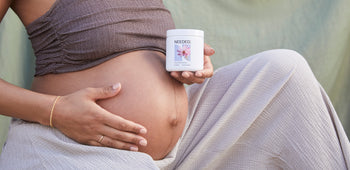On top of all of the other changes your body is experiencing during postpartum, now you’re sweating profusely at night too? Since less sleep and more laundry are not exactly on your postpartum wishlist, you might be wondering, when do postpartum night sweats stop?
The good news is, probably soon. Read on for the full scoop.
What Are Postpartum Night Sweats?
Postpartum night sweats are just what they sound like - they are when you sweat excessively at night in the weeks following childbirth.
Postpartum night sweats don’t just involve getting a little warm and sweaty at night. Instead, they cause you to wake up from sleep drenched in sweat. Many women sweat so much that they need to change their clothes and sheets or lay a towel down so that they have a dry spot to sleep.
Postpartum night sweats can also disrupt sleep, which is particularly frustrating during a time when nighttime sleep is precious.
What Causes Postpartum Night Sweats?
There are general theories as to why postpartum night sweats occur, but like many aspects of perinatal health, research is limited regarding their cause.
Low Estrogen Levels
Like so many symptoms during pregnancy and postpartum, hormonal changes can contribute to postpartum night sweats.
After birth, the high levels of estrogen and progesterone that you had during pregnancy decline rapidly. These hormonal changes can affect your body temperature and cause you to sweat profusely, especially at night.
However, even though everyone who gives birth experiences hormonal changes, not everyone will experience postpartum night sweats.
Loss of Fluids from Pregnancy
The body accumulates extra fluid during pregnancy, so some experts believe that postpartum night sweats are one mechanism that the body uses to get rid of extra fluid.
Common Signs of Postpartum Sweats
Postpartum night sweats are pretty easy to spot! The most obvious symptom is that you're sweaty at night while you sleep. You may also experience frequent wakings, a strong or different body odor, and episodes of feeling hot.
Are Postpartum Night Sweats Normal?
Postpartum night sweats are not just common, they are normal. They are a side effect of the hormonal changes that your body is undergoing during the postpartum period.
How long do postpartum sweats last?
Postpartum night sweats can start within days of giving birth and tend to resolve on their own by the end of the Fourth Trimester, around 12 weeks postpartum.
If you experience night sweats that continue beyond the Fourth Trimester, reach out to your healthcare provider to explore other causes.
What can I do about postpartum sweats?
There is not much you can do to prevent night sweats, but there are small steps you can take to manage the severity and the discomforts that come with them. Here are a few ideas:
- Adjust the temperature of your bedroom: Use a fan, open the windows, or lower the thermostat to keep your bedroom cool. Your partner will just have to go along for the ride!
- Wear loose and breathable pajamas: Loose-fitting natural fabrics tend to be more comfortable than synthetic fabrics.
- Keep extra clothes by the bed: Keep an extra pair of pajamas next to your bed to change into so you aren’t digging through drawers in the middle of the night.
- Put a mattress protector on your bed: If you consistently soak through your sheets, add a mattress protector to keep your mattress clean and dry.
- Use cooler bedding: Sheets made from cotton percale, bamboo, silk, or linen tend to help you maintain a more comfortable body temperature. Use several light layers to bedding so that you can add or remove them as needed.
- Sleep with a towel: You can lay a large towel down (a beach towel works well) before you fall asleep, or keep one nearby to lay down if you wake up with wet sheets. This helps you avoid having to change a full set of sheets during the night.
- Stay hydrated: Hydration is already important during postpartum, especially when you are breastfeeding. Sweating a lot makes hydration even more important. Keep a glass of water on your nightstand, and add in electrolytes specifically designed for pregnancy and postpartum as needed.
Washing and changing sheets and pajamas is a great way for your partner or visitors to help. Make sure they know where any extra sets of sheets are and if there are any special instructions for washing.
When to See a Doctor
Postpartum night sweats can be annoying. They interfere with sleep and add to your laundry pile (neither of which you need during the postpartum period). However, the good news is that they are temporary and will eventually stop on their own.
However, if your night sweats suddenly become more severe, or if any of the following symptoms accompany your night sweats, be sure to reach out to your doctor or midwife:
- Fever
- Enlarged lymph nodes
- Intense itching
- Pain in the joints or back
- Weight loss beyond the gradual reduction of pregnancy weight
- Diarrhea
- Wheezing
- Headache
- A tendency to bruise easily
These symptoms could indicate a condition that requires medical attention. Persistent night sweats (that last beyond the Fourth Trimester) and some of these other symptoms can also be caused by thyroid dysfunction which is common in the postpartum period.
Looking for postpartum support? Check out the postpartum section of the Needed blog and browse Needed’s Postpartum Supplements. They are thoughtfully designed to support your journey through the Fourth Trimester and beyond.













